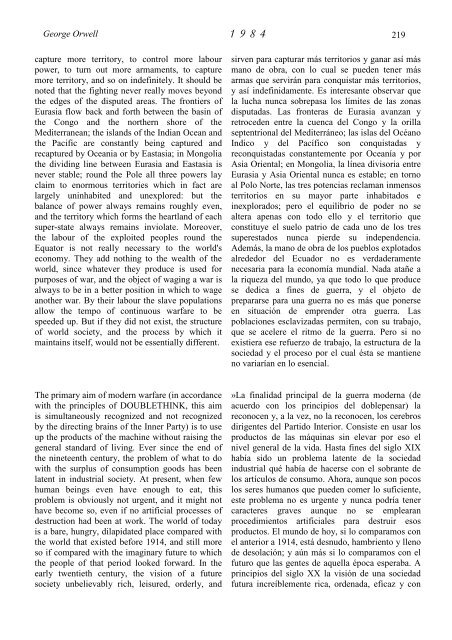You also want an ePaper? Increase the reach of your titles
YUMPU automatically turns print PDFs into web optimized ePapers that Google loves.
George Orwell 1 9 8 4<br />
capture more territory, to control more labour<br />
power, to turn out more armaments, to capture<br />
more territory, and so on indefinitely. It should be<br />
noted that the fighting never really moves beyond<br />
the edges of the disputed areas. The frontiers of<br />
Eurasia flow back and forth between the basin of<br />
the Congo and the northern shore of the<br />
Mediterranean; the islands of the Indian Ocean and<br />
the Pacific are constantly being captured and<br />
recaptured by Oceania or by Eastasia; in Mongolia<br />
the dividing line between Eurasia and Eastasia is<br />
never stable; round the Pole all three powers lay<br />
claim to enormous territories which in fact are<br />
largely uninhabited and unexplored: but the<br />
balance of power always remains roughly even,<br />
and the territory which forms the heartland of each<br />
super-state always remains inviolate. Moreover,<br />
the labour of the exploited peoples round the<br />
Equator is not really necessary to the world's<br />
economy. They add nothing to the wealth of the<br />
world, since whatever they produce is used for<br />
purposes of war, and the object of waging a war is<br />
always to be in a better position in which to wage<br />
another war. By their labour the slave populations<br />
allow the tempo of continuous warfare to be<br />
speeded up. But if they did not exist, the structure<br />
of world society, and the process by which it<br />
maintains itself, would not be essentially different.<br />
The primary aim of modern warfare (in accordance<br />
with the principles of DOUBLETHINK, this aim<br />
is simultaneously recognized and not recognized<br />
by the directing brains of the Inner Party) is to use<br />
up the products of the machine without raising the<br />
general standard of living. Ever since the end of<br />
the nineteenth century, the problem of what to do<br />
with the surplus of consumption goods has been<br />
latent in industrial society. At present, when few<br />
human beings even have enough to eat, this<br />
problem is obviously not urgent, and it might not<br />
have become so, even if no artificial processes of<br />
destruction had been at work. The world of today<br />
is a bare, hungry, dilapidated place compared with<br />
the world that existed before 1914, and still more<br />
so if compared with the imaginary future to which<br />
the people of that period looked forward. In the<br />
early twentieth century, the vision of a future<br />
society unbelievably rich, leisured, orderly, and<br />
219<br />
sirven para capturar más territorios y ganar así más<br />
mano de obra, con lo cual se pueden tener más<br />
armas que servirán para conquistar más territorios,<br />
y así indefinidamente. Es interesante observar que<br />
la lucha nunca sobrepasa los límites de las zonas<br />
disputadas. Las fronteras de Eurasia avanzan y<br />
retroceden entre la cuenca del Congo y la orilla<br />
septentrional del Mediterráneo; las islas del Océano<br />
Indico y del Pacífico son conquistadas y<br />
reconquistadas constantemente por Oceanía y por<br />
Asia Oriental; en Mongolia, la línea divisoria entre<br />
Eurasia y Asia Oriental nunca es estable; en torno<br />
al Polo Norte, las tres potencias reclaman inmensos<br />
territorios en su mayor parte inhabitados e<br />
inexplorados; pero el equilibrio de poder no se<br />
altera apenas con todo ello y el territorio que<br />
constituye el suelo patrio de cada uno de los tres<br />
superestados nunca pierde su independencia.<br />
Además, la mano de obra de los pueblos explotados<br />
alrededor del Ecuador no es verdaderamente<br />
necesaria para la economía mundial. Nada atañe a<br />
la riqueza del mundo, ya que todo lo que produce<br />
se dedica a fines de guerra, y el objeto de<br />
prepararse para una guerra no es más que ponerse<br />
en situación de emprender otra guerra. Las<br />
poblaciones esclavizadas permiten, con su trabajo,<br />
que se acelere el ritmo de la guerra. Pero si no<br />
existiera ese refuerzo de trabajo, la estructura de la<br />
sociedad y el proceso por el cual ésta se mantiene<br />
no variarían en lo esencial.<br />
»La finalidad principal de la guerra moderna (de<br />
acuerdo con los principios del doblepensar) la<br />
reconocen y, a la vez, no la reconocen, los cerebros<br />
dirigentes del Partido Interior. Consiste en usar los<br />
productos de las máquinas sin elevar por eso el<br />
nivel general de la vida. Hasta fines del siglo XIX<br />
había sido un problema latente de la sociedad<br />
industrial qué había de hacerse con el sobrante de<br />
los artículos de consumo. Ahora, aunque son pocos<br />
los seres humanos que pueden comer lo suficiente,<br />
este problema no es urgente y nunca podría tener<br />
caracteres graves aunque no se emplearan<br />
procedimientos artificiales para destruir esos<br />
productos. El mundo de hoy, si lo comparamos con<br />
el anterior a 1914, está desnudo, hambriento y lleno<br />
de desolación; y aún más si lo comparamos con el<br />
futuro que las gentes de aquella época esperaba. A<br />
principios del siglo XX la visión de una sociedad<br />
futura increíblemente rica, ordenada, eficaz y con


